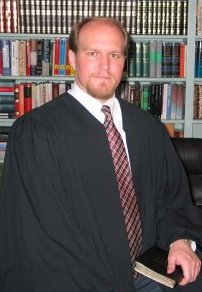Calvin, Servant of the Word of GodJuly 19, 2009
In honor of John Calvin’s 500th anniversary, the General Assembly of the Orthodox Presbyterian Church held a pre-Assembly conference on the subject of John Calvin. The Rev. Dr. Richard B. Gaffin, Prof. of Biblical and Systematic Theology, Emeritus, spoke on Calvin’s soteriology. The Rev. Glen J. Clary, WTS MDiv 2005, pastor of Immanuel Orthodox Presbyterian Church, NJ spoke on Calvin as a servant of the Word of God. Christ the Center had the privilege of welcoming Glen to the panel to discuss his lecture topic. Join us for an interesting discussion of Calvin’s theology of preaching touching on its authority, the presence of Christ, and worship. Listen to the Podcast. History of Immanuel Orthodox Presbyterian Church On June 29, 1936, at a special meeting called to consider an appropriate response to the official and judicial apostasy prevailing in the PCUSA, the congregation of West Collingswood Presbyterian Church determined by an overwhelming majority to renounce the jurisdiction of the PCUSA and to declare itself independent of all connections with that body. A statement concerning the above declaration was presented to the Presbytery of West Jersey at its meeting in Woodbury the following day, whereupon the presbytery, violating all rules for judicial process, deposed Pastor Strong without trial. Later the pulpit of West Collingswood Presbyterian Church was declared vacant. On subsequent Sundays attempts were made by presbytery to take possession of the pulpit, but its representatives were refused access to the platform. At length, following threats by presbytery of court action to eject the congregation from the church property, the congregation determined on October 18, 1936, to vacate the premises. At the same time the new congregation adopted the name Immanuel Presbyterian Church. The following Sunday services began in the nearby Crescent movie theater with 166 present in Sunday school, more than 180 at the morning worship service and nearly 150 in the evening service. On April 3, 1938, ground was broken for a new church building at Elm and Calvert avenues, and on October 2, 1938, the service of dedication was held. The congregation voted overwhelmingly on May 6, 1942, to seek affiliation with the Presbytery of New Jersey as a particular congregation of the Orthodox Presbyterian Church, and was received on May 13. In February of 1945 stated supply Charles Ellis, with the assistance of the Rev. George W. Marston, surveyed a nearby community then known as Crescent Park with a view toward beginning a branch work. The following month a Sunday school was started, and on May 18, 1947, regular morning and evening worship services began. Over the next eighteen months a solid core of dedicated believers emerged and were received into membership in Immanuel Church, and in late 1948 presbytery was requested to divide the congregation and to constitute a particular church in Crescent Park. This was accomplished on December 6, 1948, when eighteen members were removed from the roll of Immanuel Church to form what was to become Immanuel Orthodox Presbyterian Church of Bellmawr, of which the Rev. Robert W. Eckardt was the first pastor. In the mid-1940s Pastor Kellogg had a significant part in the beginning of a parent-controlled Christian day school, which held its early sessions in the basement of Immanuel Church. This school, which now has three separate campuses, has had a strong influence on the lives of many of Immanuel's young people. This church has benefited from proximity to Philadelphia, where the denomination's administrative offices and Westminster Theological Seminary are located. The people have been stimulated and enriched by presentations from the major standing committees of the general assembly, by periodic Bible courses with members of the seminary faculty, and by wise counsel from respected elder brothers as thorny problems have arisen in the congregation. On the other hand, it has been the privilege of a number of Immanuel's ordained officers to serve on various standing and special committees of the OPC. Immanuel Church sprang originally from sturdy Scottish-Irish Presbyterian stock, with a not inconsiderable Church of England flavor from Cornwall. This northern European influence is still alive and well in the thirty-six percent of the congregation who are now senior citizens, and it is our earnest prayer that as younger hands begin to take hold of the plow, Immanuel's people may in the good providence of our sovereign Lord continue to walk the center line of historic Presbyterianism. |






